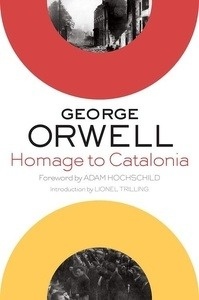Homage to Catalonia

Editorial Mariner Books
Fecha de edición mayo 2015 · Edición nº 1
Idioma inglés
EAN 9780544382046
304 páginas
Libro
encuadernado en tapa blanda
Resumen del libro
In 1936, originally intending merely to report on the Spanish Civil War as a journalist, George Orwell found himself embroiled as a participant as a member of the Workers' Party of Marxist Unity. Fighting against the Fascists, he described in painfully vivid and occasionally comic detail life in the trenches with a democratic army composed of men with no ranks, no titles, and often no weapons and his near fatal wounding. As the politics became tangled, Orwell was pulled into a heartbreaking conflict between his own personal ideals and the complicated realities of political power struggles.
Considered one of the finest works by a man V. S. Pritchett called the wintry conscience of a generation, Homage to Catalonia is both Orwell's memoir of his experiences at the front and his tribute to those who died in what he called a fight for common decency. This edition features a new foreword by Adam Hochschild placing the war in greater context and discussing the evolution of Orwell's views on the Spanish Civil War.
Biografía del autor
Fue en 1903 cuando Eric Arthur Blair, el escritor británico más conocido por su seudónimo George Orwell, nació en Motihari, India. Estudió en el Eton College de Inglaterra gracias a una beca, y prestó sus servicios en la Policía Imperial. Estuvo destinado en Birmania, de 1922 a 1927, fecha en que regresó a Inglaterra. Enfermo y luchando por abrirse camino como escritor, vivió durante varios años en la pobreza, primero en París y más tarde en Londres. Como resultado de esta experiencia escribió un primer libro 'Sin blanca en París y Londres' (1933), donde relata las sórdidas condiciones de vida de las gentes sin hogar. 'Días en Birmania' (1934), un feroz ataque contra el imperialismo, es también, en gran medida, una obra autobiográfica. Su siguiente novela, 'La hija del Reverendo' (1935), cuenta la historia de una solterona infeliz que encuentra de manera efímera su liberación viviendo entre los campesinos. En 1936 Orwell luchó en el ejército republicano durante la Guerra Civil española (1936-1939). El autor describe su experiencia bélica en 'Homenaje a Catalunya' (1938), uno de los relatos más conmovedores escritos sobre esta guerra y en el que se hace responsable al Partido Comunista Español (PCE) y a la Unión Soviética de la destrucción del anarquismo español que supuso el triunfo de la Falange. 'El camino a Wigan Pier' (1937), escrita en esta misma época, es una crónica desgarradora sobre la vida de los mineros sin trabajo en el norte de Inglaterra. Su condena de la sociedad totalitaria queda brillantemente plasmada en una ingeniosa fábula de carácter alegórico, 'Rebelión en la granja' (1945), basada en la traición de Stalin a la Revolución Rusa, así como en la novela satírica '1984' (1949). Esta última ofrece una descripción aterradora de la vida bajo la vigilancia constante del "Gran Hermano". Cabe citar entre otros escritos, la novela 'Que vuele la aspidistra' (1936) y 'Disparando al elefante y otros ensayos' (1950), ambas consideradas modelos de prosa descriptiva, y 'Así fueron las alegrías' (1953), un recuerdo de sus difíciles años de estudiante. En 1968 se publicaron en cuatro volúmenes sus Ensayos Completos: Periodismo y Cartas. Orwell murió de tuberculosis en enero de 1950, dejando tras de sí un profundo escepticismo por las marañas políticas








